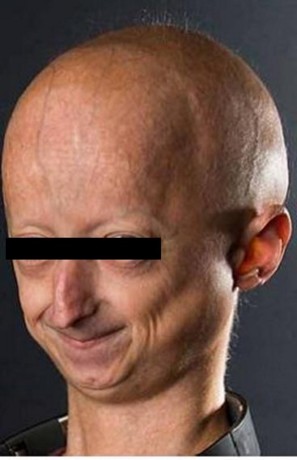(Hutchinson-Gilford syndrome or disease)
Very rare: 1-4/8.106 births. Sporadic or autosomal dominant transmission of mutations of the LMNA gene (1q21.2), gene coding for lamin and involved in other progeroid laminopathies and in the Emery-Dreifuss muscular dystrophy. Progerin is a truncated form of lamin A, the accumulation of which in the nucleus causes a defect of ADN repair and early aging.
Clinical presentation:
- look as an elderly person
- postnatal growth retardation,
- facial dysmorphism: bossing, prominent eyes, pinched nose with small tip (beaked nose), micro- and retrognathia, dental crowding due to delayed loss of primary teeth
- small mouth opening, narrow larynx (high pitched voice), risk of temporomandibular ankylosis and of reduced mobility of the neck
- early atheromatosis: coronary heart disease, cerebrovascular accidents
- osteoporosis: pathologic fractures,
- alopecia; lack of subcutaneous fat; thin, dry and wrinkled skin; hyperpigmented spots.

Usually normal intelligence. Life expectancy: about 6-20 years (median: 13 years).
Experimental treatment: lonarfarnib, statins, prevention of osteoporosis.
Lonarfarnib (a farsenytransferase inhibitor) reduces progerin accumulation and improves survival, but appears to cause calcifying lesions of the left heart (aortic stenosis).
Anesthetic implications:
Careful positioning. Fragile dentition. Coronary risk: preoperative ultrasound and stress test, 5-lead ECG and ST segment monitoring). Risk of difficult face mask ventilation and intubation. Small mouth opening: LMA placement may be difficult. Use a videolaryngoscope. Choose an endotracheal tube that matches the child's size (or the size of his little finger). Appearance of an old man, but psychology of a child.
In case of cardiac surgery: risk of heparin resistance.
References :
- Nguyen NH, Mayhew JF.
Anaesthesia for a child with progeria.
Paediatr Anaesth 2001; 11:370-371.
- Liessmann CD.
Anaesthesia in a child with Hutchinson-Gilford progeria.
Pediatr Anesth 2001 ; 11 : 611-4.
- Herd RS, Sprung J, Weingarten TN.
Primary osteolysis syndromes: beware of difficult airway.
Pediatr Anesth 2015; 25: 727-37.
- Vreeswijk SJM, Claahsen HL, Borstlap WA, Hendriks MP.
Anaesthesia and orphan disease: Hutchinson-Gilford progeria syndrome, a case report and summary of previous cases.
Eur J Anaesthesiol 2016; 33: 869-72
- Nijs K, Van de Velde M, Hoogma D.
Anesthetic considerations in children with Hutchinson-Gilford progeria syndrome : a narrative review.
Pediatr Anesth 2020 ; 30 :537-43
- Zaleski KL, Matte GS, Kleinman ME, Prakash A, Stein ML.
Anesthetic management of cardiopulmonary bypass in Hutchinson-Gilford Progeria syndrome: a case report.
A&A Practice 2024;18:e01842
- Tsai Y-T, Yang Y-C.
Hutchinson–Gilford Progeria Syndrome.
JAMA Dermatology May 14 2025
Updated: June 2025